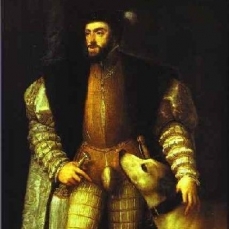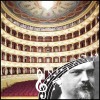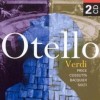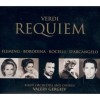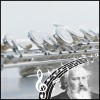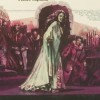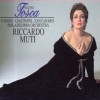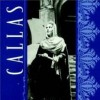歌剧剧本
Don Carlos is a five-act Grand Opera composed by Giuseppe Verdi to a French language libretto by Camille du Locle and Joseph Méry, based on the dramatic play Don Carlos, Infant von Spanien ("Don Carlos, Infante of Spain") by Friedrich Schiller. The story is based on conflicts in the life of Carlos, Prince of Asturias (1545-1568) after his betrothed Elisabeth of Valois was married instead to his father Philip II of Spain as part of the peace treaty ending the Italian War of 1551-1559 between the Houses of Habsburg and Valois. It received its first performance at the Théâtre Impérial de l’Opéra on 11 March 1867.
Synopsis
Act 1
[This Act was omitted in the 1883 revision]
The Forest of Fontainebleau, France in winter
A prelude and chorus of woodcutters and their wives is heard. They complain of their hard life, made worse by war with Spain. Elisabeth, daughter of the King of France, arrives with her attendants. She reassures the people that her impending marriage to Don Carlos, son of the King of Spain, will bring the war to an end, and departs
[This was cut before the Paris première and replaced by a short scene in which Elisabeth crosses the stage and hands out money to the woodcutters]
Carlos, coming out from hiding, has seen Elisabeth and fallen in love with her (Aria: "Je l'ai vue" / "Io la vidi"). When she reappears, he initially pretends to be a member of the Count of Lerma's delegation, but then reveals his identity and his feelings, which she reciprocates (Duet: "De quels transports poignants et doux" / "Di quale amor, di quanto ardor"). A cannon-shot signifies that peace has been declared between Spain and France, and Thibault informs Elisabeth that her hand is to be claimed not by Carlos but by his father, Philip II. Lerma and his followers confirm this, and Elisabeth feels bound to accept, in order to consolidate the peace. She departs for Spain, leaving Carlos devastated.
Act 2
[This Act is Act 1 in the 1883 revision]
Scene 1: The monastery of Saint-Just (San Jerónimo de Yuste) in Spain
Monks pray for the soul of the Emperor Charles V. His grandson Don Carlos enters, anguished that the woman he loves is now married to his father.
[In the 1883 revision, he sings the aria "Je l'ai vue" / "Io la vidi", salvaged from the omitted first Act]
A monk resembling the former emperor offers him eventual consolation of peace through God. Carlos's friend Rodrigue, Marquis of Posa, has just come from the oppressed land of Flanders (Aria: "J'étais en Flandres")
[This was cut during the pre-première rehearsals]
He asks for the Infante's aid on behalf of the suffering people there. Carlos reveals that he loves his stepmother. Posa encourages him to leave Spain and go to Flanders. The two men swear eternal friendship (Duet: "Dieu, tu semas dans nos âmes" / "Dio, che nell'alma infondere"). King Philip and his new wife, with their attendants, enter to do homage at Charles V's tomb, while Don Carlos laments his lost love.
Scene 2: A garden near Saint-Just
Princess Eboli sings the Veil Song ("Au palais des fées" / "Nel giardin del bello") about a Moorish King and an alluring veiled beauty that turned out to be his neglected wife. Elisabeth enters. Posa delivers a letter from France (and secretly a note from Don Carlos). At his urging (Aria: "L'Infant Carlos, notre espérance" / "Carlo ch'è sol il nostro amore"), Elisabeth agrees to see the Infante alone. Meanwhile, Eboli is hopeful that it is her that Carlos loves.
When they are alone, Don Carlos asks Elisabeth to request Philip to send him to Flanders. She promptly agrees, provoking Carlos to renew his declarations of love, which she resists because they are now mother and son. After the Infante leaves, the King finds the Queen unattended, and orders her lady-in-waiting, the Countess of Aremberg, to return to France. Elisabeth asks the Countess to say farewell to France on her behalf, and comforts her by telling her that at least she will be returning to her homeland (Aria: "Oh ma chère compagne" / "Non pianger, mia compagna"). The King approaches Posa. Refusing to listen to the latter's pleas for Flanders, he nevertheless places his trust in him, while advising him to beware of the Grand Inquisitor.
[This duologue was revised three times by Verdi]
Act 3
[This Act is Act 2 in the 1883 revision]
Scene 1: Evening in the Queen's garden in Madrid
Elisabeth is tired, and wishes to concentrate on the following days's coronation of the King. To avoid the divertissement planned for the evening, she exchanges masks with Eboli, assuming that thereby her absence will not be noticed, and leaves
[This scene was omitted from the 1883 revision]
[The ballet, (choreographed by Lucien Petipa and entitled "La Peregrina") took place at this point in the première]
Don Carlos enters. He has received a note suggesting a tryst in the gardens, which he thinks is from Elisabeth, but which is really from Eboli, to whom he mistakenly declares his love. The disguised Eboli realizes that he thinks that she is the Queen, and Carlos is horrified that she now knows his secret. When Posa enters, she threatens to tell the King that Elisabeth and Carlos are lovers. Carlos prevents Posa from stabbing her, and she exits in a vengeful rage. Posa asks Carlos to entrust to him any sensitive political documents that he may have, and, when Carlos agrees, they reaffirm their friendship.
Scene 2: In front of the Cathedral of Valladolid
The people rejoice at the impending coronation of the King and Queen, while monks lead in those condemned to death by the Inquisition. The royal procession follows, and the King addresses the populace, but Don Carlos brings in some Flemish deputies, who plead with the King for their country's freedom. The people and the court are sympathetic, but the King, supported by the monks, orders the deputies' arrest. Carlos draws his sword against the King, whose call for the Infante to be disarmed is not obeyed until Posa steps forward. He persuades Carlos to surrender his sword, and is rewarded with a dukedom by the King. The auto-da-fe begins, and, as the flames start to rise, a heavenly voice can be heard promising peace to the condemned souls.
Act 4
[This Act is Act 3 in the 1883 revision]
Scene 1: Dawn in King Philip's study in Madrid
Alone, the King, in a reverie, laments that Elisabeth has never loved him, that his position means that he has to be eternally vigilant, and that he will only sleep properly when he is in his tomb in the Escorial (Aria: "Elle ne m'aime pas" / "Ella giammai m'amò"). The blind, ninety-year-old Grand Inquisitor is announced. The King asks if the Church will object to his putting his own son to death, and the Inquisitor replies that God sacrificed His own son. Ascertaining that the King has nothing more to say to him, he accuses Posa of worse crimes than Carlos, notably of being a reformist, and, when Philip protests, he implies that the Inquisition could even hold the King to account. The Inquisitor leaves, and the King reflects that he is powerless before the demands of the Church. Elisabeth enters, alarmed at the apparent theft of her jewel casket, but the King produces it and points to the portrait of Don Carlos which it contains. She protests her innocence, and, when Philip accuses her of adultery, she faints and he calls for help. Eboli and Posa appear, and a quartet ("Maudit soit le soupçon infâme" / "Ah, sii maledetto, sospetto fatale") develops. The King realises that he has wronged his wife; Posa resolves to act, though it may mean his death; Eboli feels remorse for betraying Elisabeth; the latter, recovering, expresses her despair.
[This quartet was revised by Verdi in 1883]
The two women are left together. A duet, "J'ai tout compris", was cut before the première. Eboli confesses not only that she stole the casket because she loved Carlos and he rejected her, but, worse, she has also been the mistress of the King. Elisabeth tells her that she must go into exile or enter a convent, and exits. Eboli, alone, curses the fatal pride that her beauty has bestowed on her, chooses the convent over exile, and resolves to try to save Carlos from the Inquisition (Aria: "O don fatal" / "O don fatale").
Scene 2: A prison
Don Carlos has been imprisoned. Posa arrives to tell him that he will be saved but that he himself will have to die, incriminated by the politically sensitive documents which Carlos had entrusted to him (Aria, part 1: "C'est mon jour suprème" / "Per me giunto è il di supreme"). Two men, one dressed in the uniform of the Inquisition and the other carrying an arquebus, appear, unseen by Carlos and Posa. The latter is shot, and the men disappear. Posa tells Carlos that Elisabeth will meet him at Saint-Just on the following day, and says that he is content to die if his friend can save Flanders and rule over a happier Spain (Aria, part 2: "Ah, je meurs, l'âme joyeuse" / "Io morrò, ma lieto in core"). After his death, Philip enters, offering his son freedom. Carlos repulses him.
[A duet included at this point for Carlos and the King, cut before the première, was later re-used by Verdi for the Lacrimosa in his Requiem]
Bells ring, and Elisabeth, Eboli and the Grand Inquisitor arrive, while a crowd demands the release of Carlos and threatens the King. In the confusion, Eboli escapes with Carlos, while the Grand Inquisitor forces the people onto their knees and order is restored.
[After the première, some productions ended this Act with the death of Posa; however, in 1883 Verdi provided a much shortened version of the insurrection, as he felt that otherwise it would not be clear how Eboli had fulfilled her promise to rescue Carlos]
Act 5
[This Act is Act 4 in the 1883 revision]
The moonlit monastery of Saint-Just
Elisabeth kneels before the tomb of Charles V. She is committed to help Don Carlos on his way to fulfil his destiny in Flanders, but she herself longs only for death (Aria: "Toi qui sous le néant" / "Tu che le vanità"). Carlos appears and they say a final farewell (Duet: "Au revoir dans un monde où la vie est meilleure" / "Ma lassù ci vedremo in un mondo migliore").
[This duet was twice revised by Verdi]
Philip and the Grand Inquisitor enter: the King declares that there will be a double sacrifice, and the Inquisitor confirms that the Inquisition will do its duty. A short summary trial follows.
[This was omitted in 1883]
Carlos, calling on God, draws his sword to defend himself against the Inquisitor's guards, when, from the tomb of Charles V, the Monk emerges to lead Carlos away into the safety of the monastery. Philip and the Inquisitor are convinced that it is Charles V himself.





